
Digest OCTOBER 2022 MBHERALD.COM More than sixty years of sharing the life & story of the Mennonite Brethren in Canada When God’s word is at work In the patience of love’s delay VOLUME 61, NO. 10 BELIEVERS BRING WATER FOR DROUGHT BAPTISM WHEN SPRING RETURNS AN AUTUMN RESET
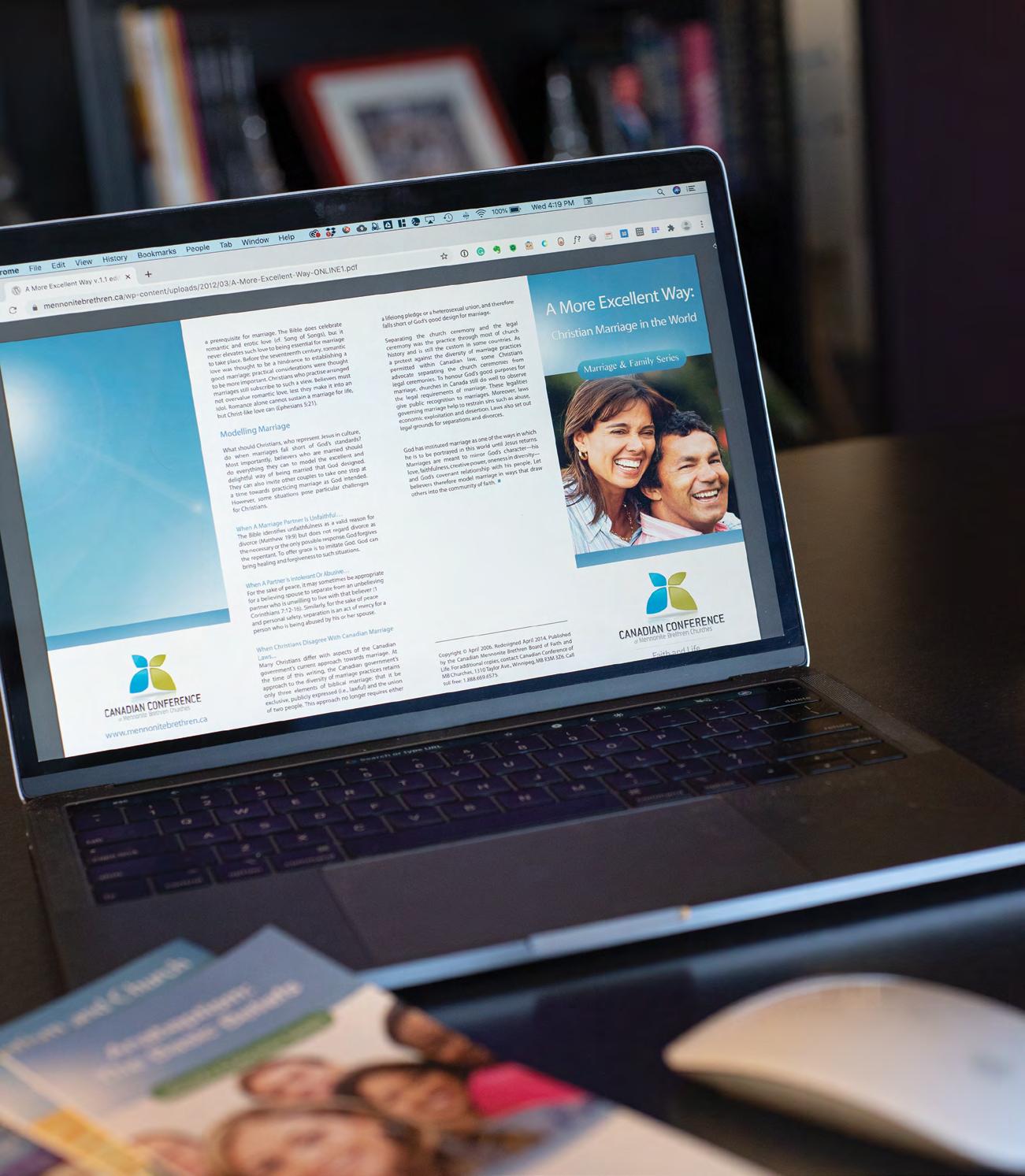
Q: How do you speak well about marriage with your neighbours, knowing that marriage can be difficult? A: Check out the Faith and Life online pamphlets about marriage and family. www.mennonitebrethren.ca/ nflt-resources NATIONAL FAITH AND LIFE TEAM
Mennonite Brethren Herald Digest is digitally published monthly by the Canadian Conference of Mennonite Brethren Churches, primarily for the use of its members, to build a Canadian MB community of faith. We seek to 1) share the life and story of the church by nurturing relationships among members and engaging in dialogue and reflection; 2) teach and equip for ministry by reflecting MB theology, values, and heritage, and by sharing the good news; 3) enable communication by serving conference ministries and informing our members about the church and the world. However, the opinions expressed here are not necessarily those of the church as a whole.
OCTOBER
EDITORIAL OFFICE
1310 Taylor Avenue Winnipeg, Manitoba R3M 3Z6
Phone: 204-669-6575
Toll-free in Canada: 888-669-6575 MBHERALD@MBCHURCHES.CA WWW.MBHERALD.COM
ISSN: 0025-9349
Mennonite Brethren Herald
WHEN SPRING RETURNS

WAYS LEADERS
WHEN GOD’S WORD IS AT
AN AUTUMN RESET
1MENNONITE BRETHREN HERALD OCTOBER 2022
Digest
2022 | VOLUME 61, NO. 10
The
is a publication of 6 8 12 11
Rev. Phil Gunther THREE
CAN MANAGE STRESS Bonita Eby
Nikki White
WORK Dr. Paul Doerksen FACEBOOK.COM/MBHERALD TWITTER.COM/MB_HERALD SOUNDCLOUD.COM/MBHERALD MBHERALD.COM Connect Sharing the life and story of Mennonite Brethren in Canada Mother and daughter are reunited in Ukraine after their home was destroyed and looted by Russian soldiers and daughter spent days hiding. Read more on page 6 CANADIAN CONFERENCE OF MENNONITE BRETHREN CHURCHES CONFÉRENCE DES ÉGLISE DES FRÈRES MENNONITES
From the editor
’ve never been a patient person. As a kid, I would spend my allow ance on action figures or comic books on the day dad placed the bills in my hand. The anticipation of a future event (good or bad) dropped my perception of time to an excruciatingly slow pace, the days filled with excitement or worry, making it impossible to concentrate.
I don’t know that much has changed; patience is a virtue I have failed to embrace. Last month I had a slight health scare. After some severe migraines, an urgent care doctor ran tests to determine if I had a brain aneurysm. Two CT scans and a lumbar puncture (also known as a spinal tap) ruled out any immediate concern. The test results returned in rela tively short order, and I barely had time to stress over it; my patience hardly stretched.
However, the following week told a different story. Two days after the lumbar procedure, I began to experience significant neck and head pain, a typical side effect of the test lasting up to two weeks. I began to experi ence significant neck and head pain, a typical side effect of the test lasting up to two weeks. It was challenging to find a comfortable posture; I was nauseous and had blinding headaches. As the days passed and the symp toms worsened, I lost patience. I found myself asking God why my healing was taking so long.
Some reading this are experiencing chronic pain or have serious ill nesses that may never fully heal. I don’t assume to put my condition in the same category; I acknowledge that patience was in short supply even in my temporary condition. I can’t imagine what it is like to know and experience long-term pain.
In the first of a four-part series entitled In the patience of love’s delay, Paul Doerksen identifies the practice of Christian patience, which is less about waiting for something we want and more about the “understand ing [that] patience begins with God, that is, God’s patience displayed in creation toward humans, revealed most explicitly in Jesus Christ and in the ongoing work of the Holy Spirit.”
In my case, I was looking for healing in my time, according to my schedule. Instead, God needed me to stop everything I was doing so that he could work in my life through other means. I won’t go into detail, but I will say that week, I received much care and empathy and was the focus of prayer. I knew without a doubt that people loved me. I saw first-hand the love of Christ through the attitudes and actions of those around me, reaffirming my faith in God. The Lord used this time of discomfort to show me his character—to draw me closer to him.
Where are you seeing God at work today, and in what ways? Some times it’s in the least possible way and at the least expected time. Be patient.
With respect,
Carson
CARSON SAMSON Communications director
THE LORD IS NOT SLOW IN KEEPING HIS PROMISE, AS SOME UNDERSTAND SLOWNESS. INSTEAD HE IS PATIENT WITH YOU, NOT WANTING ANYONE TO PERISH, BUT EVERYONE TO COME TO REPENTANCE.

2 MBHERALD.COMOCTOBER 2022
I
2 PETER 3:9
Thank you for shopping local

You could invest with any number of financial institutions, but by choosing CCMBC Investments, you also invest in the local MB Church.
Planning and saving for the future is essential. With a CCMBC Registered Retirement Savings Plan (RRSP), you can start saving for your retirement while deferring income tax and investing in the growth of God’s Kingdom.
Earn a return while investing in ministry, tax free. A Tax Free Savings Account (TFSA) is a registered plan that allows your investment to grow tax free throughout your lifetime.
CCMBC Investments is accepting new funds from existing or new investors. Contact Capstone Asset Management (1-855-437-7103) to get started.
ccmbclegacyfund.com legacy@mbchurches.ca capstoneassets.ca ccmbc@capstoneassets.ca
FOURTH AVENUE BIBLE CHURCH IS SEEKING AN EXPERIENCED PASTOR who is relational and communityminded. Located in Niverville, 35 km south of Winnipeg, we are a congregation of approximately 130 in one of the youngest and fastest growing communities in Manitoba. We are praying for a Lead Pastor who upholds the authority of Christian Scripture, who is gifted in leading and teaching, and who will challenge and equip us to live Spirit-filled Christian lives. Please direct your cover letter and resume, and/or inquiries to pastoralsearch@fabchurch.ca. For more information, please consult our website. Review of applications will begin November 1. Only those who have been shortlisted will be contacted.
Want to place a classified ad in MB Herald Digest? Contact us at mbherald@mbchurches.ca
MENNONITE CENTRAL COMMITTEE
FILL A BUCKET OF THANKS WITH MCC
This Thanksgiving season, help MCC reach a nation-wide goal to pack 1,800 relief kits and you’ll bring hope to families facing conflict or disaster with essential hygiene supplies. Join us in Winnipeg or Plum Coulee on a kit packing event date that works for you!
Believers bring water for drought baptism

In the drought-prone Borena region of Ethiopia, believers saved water to hold a baptism for 120 new believers. The area in South ern Ethiopia currently has a severe water shortage.
Believers excavated land and lined it with plastic to preserve rainwater. They used traditional methods to prevent evapora tion. Finally, in yellow 20L containers, they brought water for immersion baptism from 10 kilometres away.
Abebe Seyoum, lead pastor of Misrak Addis Ababa Meserte Kristos Church (MKC), presided over the baptism in August.
Misrak Addis Ababa was one of the four MKC local churches established in Addis Ababa after the Derg government fell in 1991. At present, the congregation supports 30 missionaries who are spreading the gospel and planting churches in remote rural areas.
More than 70 Bible study groups at Misrak MKC in the church give money every month. Some Bible study groups support one missionary each, but other Bible study groups support one mis sionary in common.
After five years of MKC mission work, there are five local churches and more than 40 new church planting centres in Borena.
“The harvest is plenty, and we need to send more mission aries to evangelize the people and plant more churches in the area,” says Abayneh Anjulo, director of MKC Evangelism and Church Planting Department.
Many of the new believers pack into small houses to meet for worship. Abayneh Anjulo, Director of MKC Evangelism and Church Planting Department, highlights the need to construct church buildings for gathering
“The decision of Misrack MKC to send a missionary or go faraway to share the gospel of the kingdom created an encour agement not only to the people in the region but also to other MKC leaders,” says Desalegn Abebe, president, MKC.
—adapted from MKC News
4 MBHERALD.COMOCTOBER 2022 HOMEPAGE
CLASSIFIEDS
MENNONITE WORLD CONFERECE
CCMBC and USMB national directors
Elton DaSilva (left) and Don Morris (right) meet in Winnipeg on September 22, 2022, to discuss partnership opportunities.
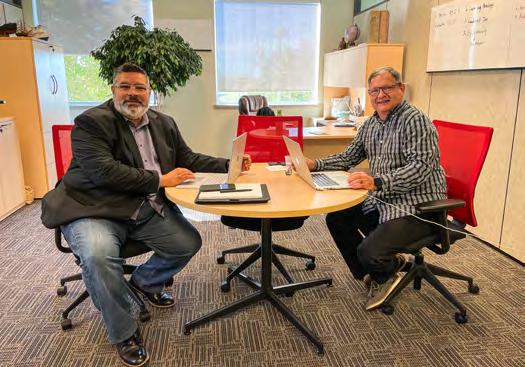
Help wanted
CCMBC NATIONAL FAITH & LIFE DIRECTOR
With establishment of the Collaborative governance model and the Collaborative Unified Strategic Plan (CUSP) a new role was introduced into the national structure. The National Faith & Life Director role is in essence, a national conference minister who aims to fulfill the approved Spiritual Health and Theology Priority Area. This is a full-time director position.
See the full employment listing here
SBCollege.ca

Need help subscribing to the online digest? Email us at mbherald@ mbchurches.ca, or call 1-888-669-6575 and ask for Carson or Holly.
COMMUNICATIONS AND CONTENT MANAGEMENT COORDINATOR (12-MONTH TERM)
The Canadian Conference of MB Churches (CCMBC) seeks to hire a 0.8 FTE Communications and Content Management Coordinator for a 12-month term.
Staff in this position must identify with and represent the Christian motivation and mission of CCMBC. This position is ideally based in Winnipeg.

See the full employment listing here
Follow God’s Call On Your Life
Train for ministry and build a solid Biblical foundation in Christ-centred community.
HOMEPAGE
WHEN SPRING RETURNS
BY NIKKI WHITE
Unlike thousands of refugees fleeing Ukraine, Yulia was des perate to get back. She had just received news that her son, a soldier, had been killed.
“I will never forget the day I heard about his death,” Yulia said. “My son, Ignat, he was most wonderful. When my husband died, Ignat was only nine. He would always help, taking his little sister, Victoria, to school, catching fish to sell. One time, he sold his motorcycle to buy me a gift for Mother’s Day!”
At the very least, Yulia thought in anguish, she could try to recover his body. But more than that, she wanted to save her sixteen-year-old daugh ter who was still trapped in Mariupol. Yulia felt that she had no choice but to leave the safety of Poland and, against the tide of evacuees, return to Ukraine.
Memories of her son competed with anxious thoughts about her daughter. Victoria had remained in their small village in southeastern Ukraine when Yulia left for Poland to find work to sup port the family. When Russia invaded, Victoria went to the city of Mariupol where her grandmother lived. After a time, she tried to return to her vil lage, but found it occupied by Russian
soldiers, their house destroyed, their belongings looted.

“She hid in broken-down houses,” Yulia said. “When she got back to Mariupol, her clothes were shredded, torn by flying frag ments of glass from the shelling. Things got worse and worse. As she traveled, she was turned back many times.”
Victoria hoped to make it to Zaporizhzhia, where many refu gees were gathering on their journey to the western borders. But it was not easy to find transportation. Day after day, she was turned away. “Hold on,” her mother told her, “I am coming.”
Yulia made it to Dnipro where her son’s body lay. There, she was given a small Ukrainian flag, in memory of Ignat. She added it to her small backpack, where a pair of sweatpants were wrapped around her documents. Then she carried on to Zaporizhzhia, in hopes of being reunited with Victoria.
As she arrived in Zaporizhzhia, Yulia was caught in a cold downpour. In addition to her clothes being soaking wet, she was exhausted, and her health was failing. Victoria was still in Berdy ansk, several hours away. At a collection point, Yulia begged for help in evacuating her daughter from Berdyansk, only to be told that there were no green corridors of safety—no one was willing to risk the drive.
“People told me to wait in Zaporizhzhia,” Yulia said, “but wait where? I knew no one in the city. I had nowhere to stay.”
YULIA FELT THAT SHE HAD NO CHOICE BUT TO LEAVE THE SAFETY OF POLAND AND, AGAINST THE TIDE OF EVACUEES, RETURN TO UKRAINE.
6 MBHERALD.COMOCTOBER 2022
Mother and daughter reunite in Zaporozhizhia and find hope at the New Hope Center

Then one of the volunteers at the col lection point made a call to a new shelter he had heard about, the New Hope Center. This ministry of Multiply in Ukraine had just ren ovated their center to accommodate refugees, with offices as dorms, classrooms as storage rooms, and a shower. The center had served for years as a ministry to families in crisis and, now in a time of war, the staff were deter mined to rise to the challenge.
“They sent a man named Yuri,” Yulia related, “a man led by God, sent to me by God.” Yuri took Yulia to the New Hope Center where, overwhelmed and exhausted, she fell sick. The kind ness with which she was cared for still brings her to tears. “I will remember them,” she said, “all my life.”
At the center, volunteers found a way to evacuate Yulia’s daughter from Berdyansk. As the days dragged on, Yuri and others prayed with her, encourag ing her to trust in God. Finally, she was told that her daughter was en route to Zaporizhzhia.
“I went right away to pray with Yuri,” Yulia said. “We prayed all evening, then again, all the next morning. We prayed for her to pass every checkpoint. Each time she did, she would call. Then we looked at the map and prayed for the next checkpoint.”
At last, mother and daughter were reunited. They embraced fiercely, tears streaming down their cheeks. Like any mother, she immediately worried that her child was too thin.
“My daughter was starving!” she said forcefully. “No food, hiding in basements, sick with fever! Dead people everywhere—adults, children. This we had seen before, in 2014, but then I had been with her. I could not bear to think of her going through this without me!”
At the New Hope Center, Yulia and Victoria recovered. “When I was
there, they showed me tulips in a jar,” said Yulia. “What? When had tulips bloomed? I was constantly crying and worried, I did not see this happen. I went outside and birds were chirping, the grass was already green. Spring had come, and I had not even noticed! Next time, I want us to notice, to see when spring returns to Ukraine.”
Eventually, the staff at New Hope Center helped Yulia and her daughter to leave Ukraine and return to Poland. Their mission was to send them on their way with new hope in God’s care and in the power of Jesus to heal and to save. Although trauma has left Victoria con stantly afraid and unable to sleep, the resiliency of the Ukrainian people is also evident as mother and daughter work to forge a future for themselves. “I will work, she will study,” Yulia stated firmly. “We are together. I want my daughter to heal, to grow, to know beauty in her life.”
PRAY / GIVE
Pray for peace in Ukraine. Praise God that, despite the ongoing war, people like Yulia and Victoria are finding hope and healing. For recent updates about Multiply’s response to the war in Ukraine, including prayer requests and giving opportunities, go to multiply.net/ ukraine-in-crisis
NIKKI WHITE serves as a writer with Multiply and also oversees Prayer Mobilization. She and her husband, Scott, are a part of North Langley Community Church in Langley, B.C.
7MENNONITE BRETHREN HERALD OCTOBER 2022
GOD’S WORD IS AT WORK
BY DR. PAUL DOERKSEN

In the pat I ence of love’s delay, part 1 WHEN
“FOR IN THE PATIENCE OF LOVE’S DELAY LIES HUMAN BLESSEDNESS.” - PILGRAM MARPECK
It’s no great insight on my part to note that we find ourselves in tumultuous times. We might high light outright warfare, opioid crises, intensifying climate events, or widespread violence as evidence of tumult and instability, but such a laundry list would inevitably be too brief to be comprehensive. Not only do these kinds of problems cause anxiety and confu sion, but the accelerated pace of change itself intensifies the tensions we experience as we try to navigate the world(s) in which we find ourselves.1
The current lived experience of significant uncer tainty provides an opportunity for us to consider what kinds of Christian practices we might cultivate in these times. One such practice is Christian patience, which sometimes drops from view in times when it’s easy to think that the primary need is for quick action which responds confidently to uncertainties. Oliver O’Dono van’s dramatic conclusion to an essay concerning issues faced by the church prompted my consideration of patience. There he asserts: “one word of caution for those who speak and for those who listen when God’s word is abroad. The first, and surely the hardest demand that it makes on them is: patience.”2 Several observations: first, O’Donovan highlights the challenge for us to rec ognize anew that ‘God’s word is abroad,’ that even a comprehensive list of crises is incapable of telling the whole story of what is going on in God’s world. The sug gestion is that when circumstances seem to indicate a shaking of the foundations, Christians ought to pay attention to signs of God at work. Further, where one might have expected O’Donovan to name the impor tance of leaping into action, we find instead a call to exercise patience.
We should be careful at the outset to recognize what we do not mean by patience. All too often, in our con ception, patience “has come to mean an indiscriminate, self-immolating, crabbed, joyless, and spineless sub mission to whatever evil is met with or, worse, deliberately sought out. Patience, however, is something quite other than the indiscriminate acceptance of each and every evil…”3 Importantly, our understanding of Christian patience is delusionary if seen as “an invita tion to escape from the tasks of large struggles against gargantuan and fast-moving whirls of destruction;”4 patience is misguided if taken to mean the preserving
1 See Hartmut Rosa, Social Acceleration: A New Theory of Modernity, 2015.
2 Oliver O’Donovan, “Homosexuality in the Church: Can There be a Fruitful Theological Debate?” in Eugene Rodgers, Jr., ed. Theology and Sexuality, p. 86.
3 Josef Pieper, The Four Cardinal Virtues: Prudence, Justice, Fortitude, Temperance, p. 129.
4 Stanley Hauerwas, “The Politics of Gentleness: Random Thoughts for a Conversation with Jean Vanier,” p. 193.
2 PETER 3:14-15
of the status quo;5 patience is false when it derives from indifference, weakness, or short-sightedness.6
Further, I am not suggesting that Christian patience is fully expressed in what we might call ‘natural patience,’ the kind of actions taken by a hiker who pauses to rest on her way to a destination, a farmer waiting for a crop to grow, a mother with her children. While these examples qualify as the exercise of patience, they can also be understood as providing a way to get something we want, for “gaining what is coveted.” 7 Rather, for Christians, the understanding of patience begins with God, that is, God’s patience displayed in creation toward humans, revealed most explicitly in Jesus Christ and in the ongoing work of the Holy Spirit.
To clarify our understanding, I highlight two pas sages of Scripture, which serve as a brief display of the broad strokes of a biblical view of patience, namely: 1) that God practices divine patience toward his creation, and 2) that humans are also called to practice patience. However, to recognize patience as divine and as human ought not to lead us too quickly to a conclusion that runs something like: because God is patient, humans too ought to be patient; that the patience to which humans are called can be understood as being mod elled directly on God’s exercise of that virtue. That is, while divine and human patience may be related, it is not the case that human patience is simply a pale ver sion of the divine.
5 Hauerwas, A Better Hope, p. 277.
6 Karl Barth, Church Dogmatics, The Doctrine of God, II.I, p. 423.
7 Soren Kierkegaard, Eighteen Upbuilding Discourses, p. 161.
9MENNONITE BRETHREN HERALD OCTOBER 2022
“WHILE YOU ARE WAITING FOR THESE THINGS, STRIVE TO BE FOUND BY HIM AT PEACE, WITHOUT SPOT OR BLEMISH; AND REGARD THE PATIENCE OF OUR LORD AS SALVATION.”
Regarding divine patience then, the apostle Peter writes, But do not ignore this one fact, beloved, that with the Lord one day is like a thousand years, and a thousand years are like one day. The Lord is not slow about his promise, as some think of slowness, but is patient with you, not wanting any to perish, but all to come to repentance…Therefore, beloved, while you are waiting for these things, strive to be found by him at peace, without spot or blemish; and regard the patience of our Lord as salvation.” Peter describes God as exer cising patience with people, an offer that opens the possibility of repentance and salvation, and exhorts his readers, who are ostensibly the recipients of God’s patience, to wait in peace for the renewal of all things. (2 Peter 3:8-; 14-15).
Second, James adds a call for human practice of patience with an emphasis that is different than Peter’s. “Be patient, therefore, beloved, until the coming of the Lord. The farmer waits for the precious crop from the earth, being patient with it until it receives the early and the late rains. You also must be patient… As an example of suffering and patience, beloved, take the prophets who spoke in the name of the Lord. Indeed, we call blessed those who showed endurance. You have heard of the endurance of Job, and you have seen the purpose of the Lord, how the Lord is compassionate and merciful.” James counsels patience on the part of the reader, offers encouragement in the fact that the coming of the Lord is near, and provides examples to follow in the prophets of Israel, explicitly offering the blessed pattern displayed by Job. (James 5:7-11)
But we might still inquire further and ask what patience is – of what does it consist? One way to come to fuller understanding of the nature of patience referred to and described in the Bible is to examine those terms that are translated into English as ‘patience.’ Two of the key terms are makrothumia and hupomeno Makrothu mia , “a compound word (makros – long, and thumos – anger) carries with it the notion of taking a long time to get angry, describing a person who takes some time prior to reacting, or retaliating, or perhaps even chang ing course.”8 Makrothumia also includes the notion of being “long-spirited,” of being willing to wait for things to grow.9
The closely related term, hupomeno, carries with it a strong sense of survival, of holding out. New Testa ment scholar Susan Garrett suggests that “hypomone literally means “steadfastness” or “standing fast,” and in the period of early Judaism and Christianity it des ignated a supreme virtue: energetic resistance to hostile
forces.”10 Additionally, Garrett argues that the dimen sion of endurance is central here, especially as demonstrated in the life of Jesus. Neither term is con sistently translated as ‘patience,’ but also by terms such as forbearance, endurance, perseverance, or steadfastness.11
While careful definition is important and provides insight, the pursuit and refining of such definitions cannot do the work needed to come to a nuanced under standing of patience in the Bible. Simply noting the terms cited above, one can already see that, taken together, they begin to offer a multi-faceted meaning that does not rely on a clear distinction of meaning. The details of technical word study may not be the most fruitful way to pursue an understanding of patience. Rather than trying to define the term abstractly, we can look to understand patience as conveyed through narrative accounts, which “point rather than define.”12
Here I want to turn to the work of David Baily Harned, who, in his wonderful book, Patience: How We Wait Upon the World, does not pursue the recovery of meaning of patience via the locking down of defini tions; rather, he frames the understanding of Christian patience within the broader narrative of God’s patience as displayed in the Bible. The focus on a narrative account of patience allows Harned to make the case that patience properly understood includes a long list of dimensions that make up its meaning. For example, Harned finds in the Bible an oft-appearing triad of ‘mer ciful and gracious, slow to anger, abounding in steadfast love and faithfulness;” the reader finds that “[t]ime and again the Bible declares that God is gracious, merciful, and patient…the patience of God is the very heart of the story.”13
In the next article in this series, I will take up this topic of God’s patience as it is displayed in narrative form, focusing specifically God’s patience with the cre ated world, and especially with humanity. The central truth I will develop is that God’s patience grants us space and time to become the people God created us to be.
10 Susan R Garrett, “The Patience of Job and the Patience of Jesus,” p. 256.
11 Hebblethwaite, p.142.
Ibid.
13 David Baily Harned, Patience: How We Wait Upon the World, p. 25.
DR. PAUL DOERKSEN is Associate Professor of Theology and Anabaptist Studies at Canadian Mennonite University.

10 MBHERALD.COMOCTOBER 2022
8 Ron Julian, Waiting for God (blog). 9 Margaret Hebblethwaite, “Patience,” p. 142.
12
Resilient Leadership
THREE WAYS LEADERS CAN MANAGE STRESS
It’s no secret that leaders everywhere are facing high degrees of stress. Here are three steps to begin managing stress today.
1.
RECOGNIZE STRESS
Recognizing stress in its beginning stages is profoundly helpful. Most people only notice it once they are in a spiral of stress, but God has made our bodies incredible and pro vided us with warning signs that a stress cycle is about to begin.
When we experience a stressful situ ation, whatever the circumstance, many symptoms may occur, but we may not nat urally notice them. These may include signs such as shallow breathing, tight shoulders or a stomach ache.
By getting a handle on what symptoms you experience with stress, for example, rapid heartbeat, headache and muscle ten sion, you can pinpoint why it caused you stress. The more we can deal with stress at this point, rather than when a full-blown stress cycle is activated, and we go into sur vival mode, evidenced by a fight, flight or freeze response, the better we’ll be. This is the first step to managing stress.
2.
REMOVE THE STRESS
Oftentimes, we don’t have control over the situations and circumstances that cause us stress. But we do have the ability to reverse the stress cycle.
According to research, much of our non-clinical anxiety comes from our reac tion to stress signals in our body (rapid
heartbeat, clenched muscles, shallow breathing, etc.) rather than as a result of the stressor itself.
Our nervous system has an integrated biofeed back mechanism. What that means is that when we feel stressed, our bodies react via certain norms. For instance, when our heart is racing, and we feel stressed out, we may reach for sugary snacks or unleash anger upon a co-worker to deal with what we’re feeling.
On the flip side, if we intentionally choose to act differently, we feel more relaxed. For instance, when our breathing becomes fast, shallow and misplaced in our chest, try slowing your breath. Breathe in from your diaphragm, relax your shoulders and slowly breathe out. This gives the biofeedback loop the information it needs to begin calming the nervous system—and therefore your stress cycle—down.
A second way to remove the stress is through our minds. God has provided us with the rich gift of Scripture. By reciting Scriptures that remind us of God’s constant presence, provision and love, we refo cus on who is in control and refocus on truth. We truly are transformed by the renewing of our minds.
3.
RESILIENCE TO STRESS
The more we practice removing the stress, the faster we’ll be able to do so in the future. This is because whenever we practise something repeatedly, our brains lay down new pathways that make it easier to activate over time. In other words, our resilience will increase over time by recognizing our stress before it spirals and removing it by having our body and mind lead the way.
BONITA EBY
attends and is a former pastor at WMB Church in Waterloo, Ontario. She is a burnout prevention strategist, executive coach, and owner of Breakthrough Personal & Professional Development Inc. Connect with Bonita at bonita@break-through.ca.

11MENNONITE BRETHREN HERALD OCTOBER 2022
An

autumn reset Is I t t I me to assess, adjust and rev I ve your d I sc I plesh I p? By r ev. p h I l a Gunther “FORGET THE FORMER THINGS; DO NOT DWELL ON THE PAST. SEE, I AM DOING A NEW THING.” ISAIAH 43:18 NIV “TODAY IS A GREAT DAY TO START SOMETHING NEW.” COMMON PROVERB
Discipleship (noun) – the state of being a disciple and at the same time a pattern of following Jesus.
German philosopher Friedrich Nietzsche once said, “Autumn is more the season of the soul than of nature.” I resonate in my spirit with his sentiment. As we enter the season of autumn, I am expe riencing in my heart a deep yearning to weigh how I am currently living out my discipleship. Too often I take it for granted and simply shuffle along. Healthy discipleship does not happen naturally or auto matically, it is a deliberate work of the soul. I am convinced that the most effective disciples are those who take time to ponder what God is up to in their lives. Coupled with that, self-understanding is a vitally important pursuit to engage in for any faithful and fruitful disciple. In his book Soul Care, Rob Reimer writes, “Self-awareness is the gateway to life change.”
And so, here we are. What follows is an articulation of my thoughts as I’ve been pondering an autumn disci pleship reboot or renewal.
In my mind, a reasonable place to start any dedi cated discipleship reset seems to be by looking for some signs of an actual need for it. In my view, here are ten signs that could point to a need for an autumn disci pleship reset:

˚
I’m experiencing a spiritual ‘numbness’.
˚ I’m not practicing the spiritual disciplines.
˚ I am not balanced when it comes to investing in my work. life, relationships, and my own self-care.
˚
I have an insufficient diet of Scripture.
˚ I live life by sight more than by faith.
˚ I routinely experience either indifference or anxiety.
˚
I don’t have a passion for the Gospel; it is not shaping me to be like Jesus.
˚ I struggle with my identity in Christ.
˚
The influence of social media (cul ture) shapes my life more than the Holy Spirit.
˚ Regarding others, I tend to assume
˚
the worst rather than believe the best about them.
Joy and peace are often absent in my life.
Engaging with these ten questions will give one a good sense of how they fare on the discipleship wellbe ing barometer. If you are convinced that you require a discipleship reset, it seems wise to conduct a litmus test of your present practices as a disciple of Jesus. The main thing in discipleship is being a faithful and obedient disciple of Jesus.1 That being said, there are seven ques tions that come to mind for me that could be asked about one’s discipleship:
˚
Am I keeping the main thing the main thing?
˚
Am I seeking to live out the main thing from a space of self-effort and self-reliance or as a Spir it-led, love response to the Gospel?
˚
What needs to start, stop, or change as I pursue living out the main thing?
˚
What has the Holy Spirit revealed to me about how I am living out the main thing? How am I acting obediently to the Holy Spirit’s revelation?
˚ What are my growth areas, blind spots, and fes tering sins?
˚
Am I daily seeking the wisdom of Scripture and wise counselors?
So, you’re likely now at least thinking about an autumn discipleship reset. I am persuaded that such a venture should start with goal setting. Should one not want to start with the end in mind? It just seems wise to identify a destination as one charts a path on this quest. The importance of goal setting cannot be over stated. Best-selling author Tony Robbins once penned,
1 Matthew 10:38-39; 2 Corinthians 5:15,20; Galatians 2:20; Philippians 3:7-8; 1 Peter 2:9,16; 3:15.
I am convinced that the most effective disciples are those who take time to ponder what God is up to in their lives.
Any discipleship reset needs to involve Scripture. Scripture is living, transforming, and more than able to serve as a mirror into our own soul (Hebrews 4:12).
helps best organize one’s thoughts and pathway;
helps one choose the resources and skilfully plan one’s time;

aids in saying ‘no’ to distractions;
provides one with a means to measure progress and
it holds one accountable.
Okay. After understanding one’s ‘sitz-im-leben’ (setting in life) and identifying end goals, what are some reasonable next steps? Great question. The following are a few that I believe are helpful: Create sufficient space for a discipleship reset. Rushing a reset will bear little but frustration. There is a Swahili proverb that teaches, “Haste has no blessings.”
In a similar vein, the author of Minute of Margin, Rich ard Swenson, writes, “Very little of spiritual value happens in the presence of speed.” Consider breaking down your discipleship reset into four stages based upon your needs and goals: immediate, short-term, mid-term and long-term.
Seek the counsel of wise godly believers. Ask trusted and spiritually mature believers how they them selves have invested in forming healthy discipleship. Scripture reminds us: “Get all the advice you can, and you will succeed; without it you will fail” (Proverbs 15:22 GNT).
Invite the Holy Spirit into every step of the reset. Prayer is critical. The Holy Spirit knows us intimately and “helps us in our weakness” (Romans 8:26 NIV). He reveals to us the deep things of God – the purposes of God for us – and even the constitution of our own hearts.
Allow the Scriptures to be your inspired living compass. “All Scripture is inspired by God and is use ful to teach us what is true and to make us realize what is wrong in our lives. It corrects us when we are wrong and teaches us to do what is right. God uses it to pre pare and equip his people to do every good work” (2 timothy 3:16-17 NLT).
Any discipleship reset needs to involve Scripture. Scripture is living, transforming, and more than able to serve as a mirror into our own soul (Hebrews 4:12). It also provides a path forward no matter what life cir cumstance you bring to it. Are there some passages of Scripture that serve one well in a discipleship reset? Yes. I suggest taking some time to recall texts that have already proven impactful in your discipleship. 2 Jot those down, choose a handful, and over time meditate upon them. Using the spiritual practice of Lectio
2 If your Scripture recall is coming up short, consider the following: Psalm 1, 23, 51, 121, 139; Proverbs 3:5-6; Matthew 5:1-16; 10; 22:34-40; 28:16-20; Romans 8; 1 Corinthians 13; 2 Corinthians 5; Ephesians 2:1-9; 5:1-20; 1 John 4; 1 Peter 2.
14 MBHERALD.COMOCTOBER 2022
˚
˚
˚
˚
Divina is particularly helpful. I also recommend some ‘go-to’ Bible texts that keep you motivated when you feel deflated or defeated. 3
Journal your insights, responses to those insights and action steps arising from the two. Journaling helps a person better connect with their thoughts and feelings. It also has been proven to bring clarity to life situations and current behavior. Lastly, journaling facilitates substantive personal discipleship growth.
Be prepared for setbacks. We are after all, human. Imperfect creatures. By default, we are self-centered when we should be Christ-centered; we strive for inde pendence when Jesus calls us to greater dependence on him. We tend to rationalize ‘fleshly’ shortcomings and downplay our ungodly proclivities. All of these do bat tle against our efforts at healthy spiritual formation into the image of Christ. Therefore, any discipleship reset is bound to experience, at best, hiccups of one kind or another. Be prepared for them and respond with patience, appealing for help from the Holy Spirit.
Participate in a discipleship growth group. If not already, join a group of dedicated followers of Jesus who not only want to learn to be like Jesus but are also committed to disciple-making. I recommend that the group not just be about Bible study but intentional about sharing their space with those who don’t know Jesus. Lastly, this group should have an accountability com ponent to it.
Invest in serving. One of the most powerful claims shared with me about healthy and fruitful discipleship was that it comes with a posture of giving one’s life away. The counsel of Scripture teaches: “Each of you should use whatever gift you have received to serve oth ers, as faithful stewards of God’s grace in its various forms” (1 Peter 4:10 NIV). We enhance our discipleship through pouring our lives into serving others. So too, we can also reset and revive it through serving.
Understand that this is NOT about trying harder. A discipleship reset is truly about a surrender of our selves to the transforming and redemptive work of God. It is a work of grace. Yes, we play a role, but chiefly it is one of allowing God’s Spirit to do a supernatural reset of our soul. Such an act of submission is our response of love and obedience.
There is so much more one could say on this mat ter of rebooting or renewing one’s discipleship. However, that must be for another time and this piece remain as
3 Two suggestions: “…my dear brothers and sisters, stand firm, let nothing move you. Always give yourselves fully to the work of the Lord, because you know that your labour in the Lord is not in vain” (2 Corinthians 15:58 NIV). “I can do all things through him who gives me strength” (Philippians 4:13 NIV).
a primer. For now, let me close with an anecdote: During seminary training in Virginia, my wife and I would often take autumn day trips into the Shenandoah woods where the trees looked like they were on fire. The spec trum of red, orange and yellow coloured foliage was simply breath-taking. It was for us an amazing testi mony of God’s creativity, power and love. In this dazzling display of his creation, we sensed God was doing a new thing all around us, something we were blessed to enjoy. Like he does in creation, God also desires to do an incred ible new thing in our discipleship and for you that may be a discipleship reset this autumn. May the Lord give you wisdom and insight. May the following quote inspire you to something new.
C.S. Lewis
REV. PHILIP A GUNTHER is director of ministry for the Saskatchewan Conference of MB Churches

15
“There are far, far better things ahead than any we leave behind.”
Anabaptismat


REGISTER TODAY! Anabaptismat500.com. 1-800-245-7894 An approach to Scripture that is Jesus-centered, interpreted together, and transforms our lives. ADD YOUR VOICE TO THE FIRST-EVER ANABAPTIST BIBLE That’s all it takes to participate in this once-in-a-generation project. Be among 500 study groups to contribute to the Anabaptist Bible. Participating is easy. Just follow these six simple steps: Form your group Scan QR code to register Read 3 assigned passages Meet 4 times to read and study together Use the 5 prompts to guide your Bible study Send in your insights, applications, and questions
500
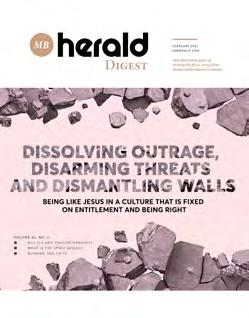
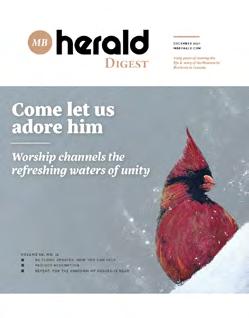




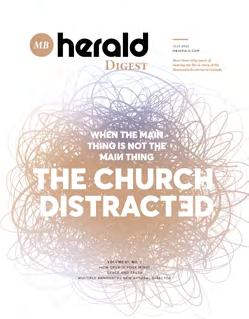
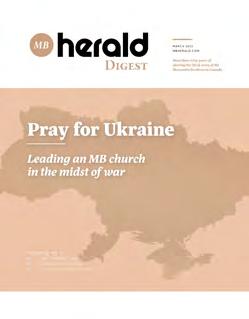

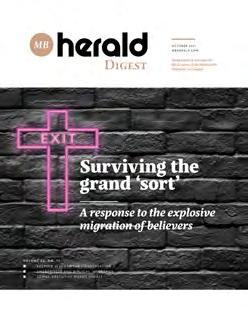

SHARE THE MB HERALD DIGEST WITH YOUR FRIENDS SIGN UP FOR THE MB HERALD DIGEST AT MBHERALD.COM/SUBSCRIBE OR CONTACT US AT (888) 669-6575 MBHERALD@MBCHURCHES.CA THINGS ARE BETTER WHEN THEY’RE SHARED
A moment in time
1980
A wide-angle shot of a prairie landscape with musicians making music. It was used as an album cover (designed by Gareth Neufeld and John Longhurst) for a 1980 record called “Friend to Friend,” a collection of music by four music groups--Immanuel, Bondservant, Don Falk, and Iron River Road. See The June 7, 1980 MB Herald story on the next page.
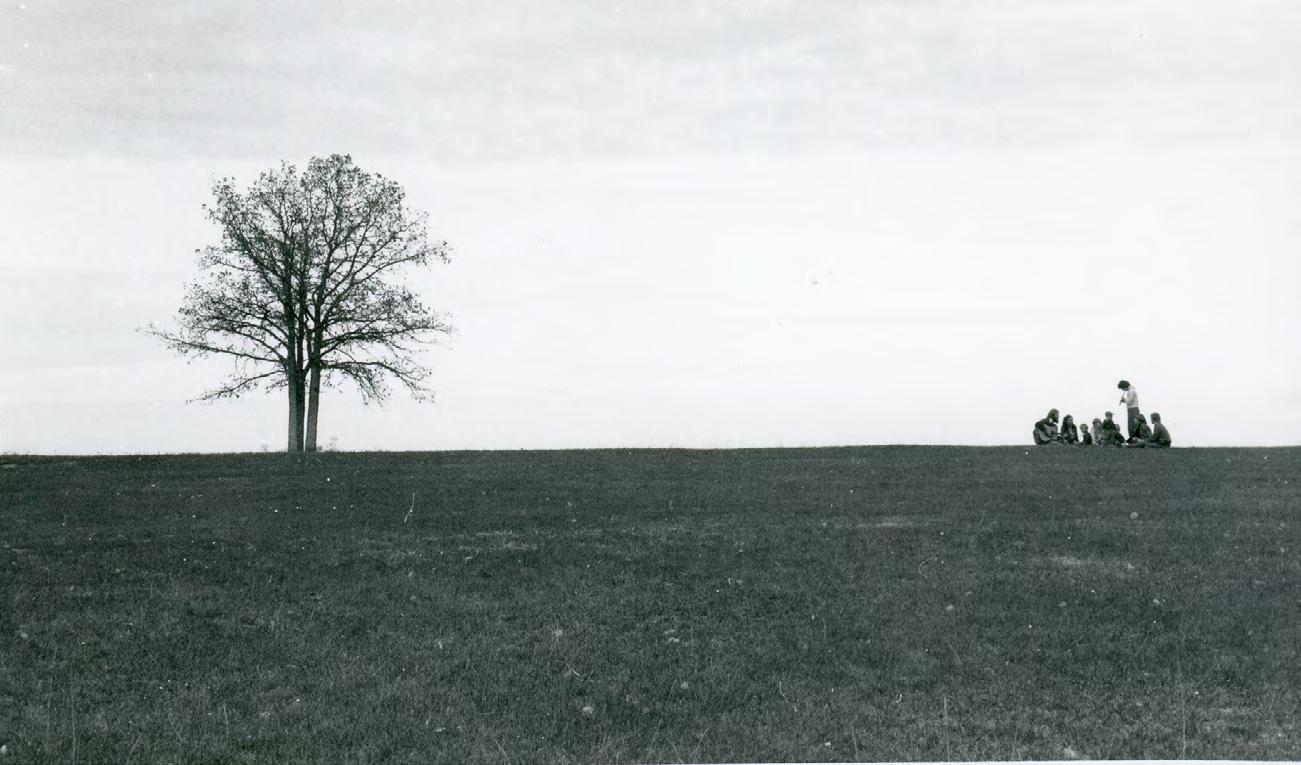
18 MBHERALD.COMOCTOBER 2022
Courtesy of the Mennonite Archival Information Database

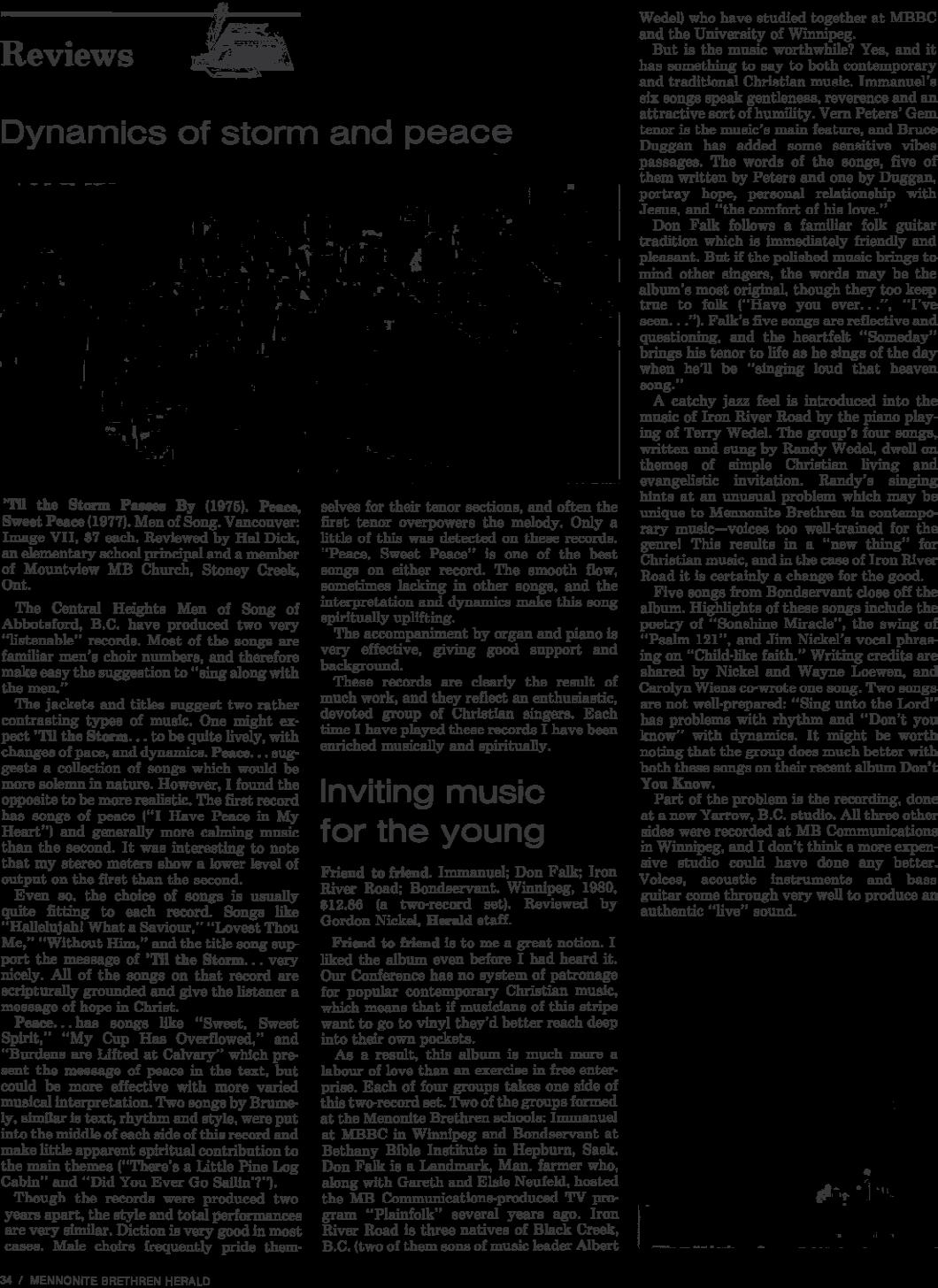
19MENNONITE BRETHREN HERALD OCTOBER 2022

SUBSCRIBE TO MB HERALD DIGEST WWW.MBHERALD.COM/SUBSCRIBE-VIA-EMAIL



































